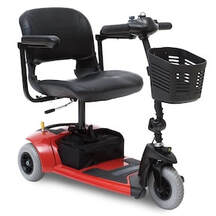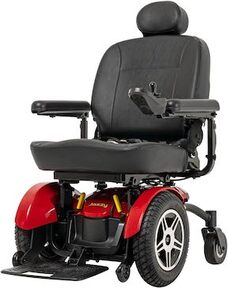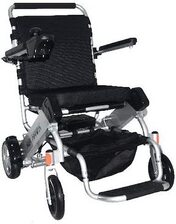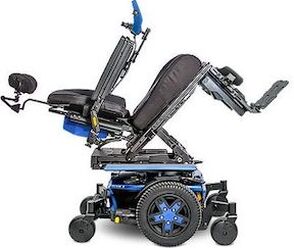Getting the right power mobility device at the right time can help you conserve energy, prevent falls and injuries, and remain more independent. Power mobility devices fall into four general categories:
Power Scooters
|
Motorized scooters are similar to what you might see at the supermarket. They have a base for your feet, armrests, a swivel seat, and handlebars out front. You must have enough shoulder and trunk strength to reach out and operate the hand controls. Scooters are mainly used outside of the home and can be very useful for traveling about in the community. However, they are not designed for long periods of sitting, do not offer head or trunk support, and can make transferring difficult.
|
Standard Power Wheelchairs
|
Standard power wheelchairs provide more support than scooters and have a better turning radius within the home. Compared with a custom power wheelchair, it has limited adjustment possibilities and no ability to tilt or recline. It is usually hand-operated with a small joystick. A standard power wheelchair can be helpful for moving inside or outside of the home. You will need a vehicle lift for the back of your car or a handicap-accessible van to transport it.
|
Portable Power Wheelchairs
|
Portable power wheelchairs provide many of the same functions as a standard power wheelchair and are also driven by a joystick. Portable power wheelchairs are popular because they are lighter and easier to transport. Some fold up. Others can be broken down into four or five manageable pieces. They are designed to be compact and fit into most trunks to make it easy for travel.
|
Custom Power Wheelchairs
|
These motorized, high-end wheelchairs (also called complex rehab or Level 3 power chairs) are custom fitted to support your body and postural needs. Their cutting-edge technology—including the tilt/recline feature, power leg rest, alternate driving modes and controls, and integrated Bluetooth® capabilities—can adapt to your evolving needs. Portable respiratory and communication devices can be mounted or attached.
|
|
Sign up for our free newsletter to stay up-to-date on new content, equipment, ALS news, resources, and more.
|
How will I know what I need, and when?
|
Always begin by consulting with your neurologist and ALS clinic or medical team. They can help you determine which power mobility device is best for you—and when you should get it. The sooner you get the appropriate piece of equipment, the safer, more comfortable, and more independent you’ll be.
|
|
|
If you need more than a walker or manual wheelchair, but are not yet ready for a big custom power wheelchair, we recommend asking to borrow a power scooter, standard power wheelchair, or portable power wheelchair from your local ALS organization loan closet.
Your Medicare health insurance will only cover one power mobility device every five or so years. It is important to not use your benefit on a less expensive item like a scooter or standard power wheelchair. You will want to use it on a much more expensive custom tilt/recline power wheelchair. Most people living with ALS will eventually need the extra support and upgraded functions of a custom power wheelchair. |
|







